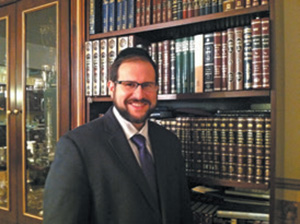
During the past few weeks, I’ve received a plethora of would-be halachos that would apply if secular holidays and their symbols were actual mitzvos.
There was the discussion of the halachos of the Halloween pumpkin and the laws of hiddur, including if the pitum fell off, etc.
Then there were the various laws of the Thanksgiving turkey, including how the turkey must be prepared (cooked, fried or roasted), how much one must eat to be yotzei, how much of the story of the Pilgrims must be shared while eating, and what is the proper amount of gratitude that must be expressed.
It gets even more outlandish with the discussion of what the halachos would be about erecting a holiday tree in one’s home—when it must be cut, is a non-Jew allowed to help with the cutting, can one reuse an old tree, how high the tree must be, where it must be placed in the home, etc.
Although it may be witty, why would I even write about such nonsense? Because the more I thought about it, the more I realized that it’s probably true. If there would be any sort of mitzvos involving these artifacts, they would undoubtedly contain many parameters and laws, like every other facet of Judaism. But here’s the point that is often missed. Some people hear such an idea of imaginary laws, and roll their eyes thinking about how lucky their non-Jewish neighbors are that they don’t have to be bothered with such cumbersome laws. But therein lies the tragedy, and perhaps greatest spiritual danger of our times.
Why are there so many laws involved in all of our holy mitzvos?
I remember being a chasan and planning the next time I would have the opportunity to spend the day with my kallah. The arrangements I made weren’t just about where we would go, but also about finding little things along the way that I knew she would enjoy. The same held true about the things she did for me. It wasn’t just the gift or a packed meal, but all of the additives in the bag that I knew were made with a great deal of thought because she knew I would find them personally meaningful.
The fact is that true love and devotion is expressed in the details. Anyone can present someone else with a beautiful gift, but only someone who truly loves someone else will expend tremendous amounts of time on all of the seemingly petty details. Think about the things parents do for their children. Think about how much extra energy they expend on all of the details in their children’s life. Those details aren’t necessary for the child’s wellbeing, but the parents love their children and can hardly hold back from expressing it.
Each mitzvah that we have the opportunity to perform is an added chance to foster and further develop our connection with Hashem. That is ultimately what Judaism is about, and that is perhaps the fundamental difference between Judaism and all other religions. It’s not just that God loves us, but that He desires and seeks for us to build a personal and unique relationship with Him.
Since it’s all about the relationship, there are many details involved in the proper performance of every mitzvah. Although many mitzvos can be performed on a basic level, where is the relationship-building in that?
The uniqueness of laws endemic to every mitzvah is a testament to the fact that we have a higher purpose in our fulfillment of mitzvos. It’s not merely about commemoration or symbolic rituals, it’s about deepening the connection and making it more genuine.
Those who develop an appreciation for Yomim Tovim and mitzvos cannot get enough of all the laws involved in their performance.
A woman who becomes overwhelmed before Yom Tov can view it as a kallah who feels overwhelmed the night before her chasan comes to her home. Sure, she is stressed, but it’s because she wants so much to demonstrate to him her devotion and appreciation for him. She wants everything to be perfect for their time together. Shabbos, Chanukah, Pesach, etc. are all about the relationship.
We are fortunate to have been chosen for that special connection. The proof is in the details
By Rabbi Dani Staum, LMSW
Rabbi Dani Staum, LMSW, is the rabbi of Kehillat New Hempstead as well as a rebbe and the guidance counselor at Heichal HaTorah in Teaneck, New Jersey, principal at Mesivta Ohr Naftoli of New Windsor, and a division head at Camp Dora Golding. He also presents parenting classes based on the acclaimed Love and Logic methods. His email address is [email protected]. His website is www.stamtorah.info.













